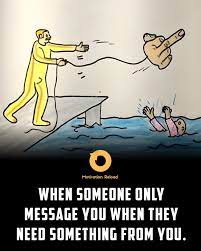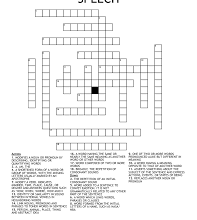Key points about only when they need you quotes

Unlocking the secrets of human behavior has always been a fascinating endeavor. From deciphering body language to understanding the power dynamics in relationships, delving into the intricacies of human interaction is like unraveling a beautiful tapestry. One particular aspect that often leaves us pondering is when people are only there for us when they need something. We’ve all encountered those individuals who seem to disappear from our lives until they require a favor or assistance. It’s an experience that can leave us feeling used and unappreciated. In this blog post, we will explore the psychology behind these “only when they need you” quotes, examine their impact on our well-being, and learn valuable strategies for handling toxic relationships with grace and self-respect.
Let’s dive deeper into this intriguing phenomenon!
What are
What are these “only when they need you” quotes that we often come across? Well, they are statements or expressions that reflect the behavior of individuals who only seem to show up in our lives when they require something from us. These quotes can take various forms, such as “They only reach out when they want a favor” or “You’re important to them until you can no longer meet their needs.”
The underlying message here is clear: these individuals prioritize their own interests and convenience above fostering genuine connections or meaningful relationships. They may be charming and friendly when seeking assistance but display little interest in reciprocating support or investing time and effort into maintaining a balanced friendship.
It’s essential to note that not everyone who reaches out for help falls under this category. Genuine friendships involve mutual care and consideration, with both parties supporting each other through thick and thin. However, it’s crucial to be aware of those individuals who consistently exhibit patterns of behavior centered around their self-interests.
These quotes shed light on an unfortunate reality – some people view relationships as transactional rather than based on emotional connection. It can be disheartening to realize that someone’s presence in your life hinges solely on what you can offer them at any given moment.
Understanding the nature of these quotes helps us navigate the complexities of human dynamics more effectively. By recognizing the signs early on, we gain insight into whether a relationship is built on trust, respect, and reciprocity or if it leans toward one-sided dependence.
Now that we have explored what these quotes represent let’s delve deeper into the psychology behind them and discover how they impact our well-being.
The Psychology Behind These Quotes
The Psychology Behind These Quotes
Have you ever come across a quote that says something like, “They only reach out when they need something”? These quotes have become quite popular on social media platforms, and for good reason. They resonate with many people because they tap into a deeper psychological truth about relationships.
At its core, these quotes highlight the concept of conditional love or friendship. When someone only reaches out to you when they need something from you, it suggests that their affection or interest in you is contingent upon what you can provide them with.
This type of behavior can be deeply hurtful and damaging to one’s self-esteem. It creates an imbalance in the relationship dynamics and leaves one feeling used and unvalued. The person on the receiving end may start questioning their worthiness or wondering if they are simply being taken advantage of.
From a psychological perspective, this behavior often stems from a lack of empathy on the part of the individual who only reaches out when they need something. They may struggle to fully recognize or appreciate others’ emotions and needs outside of their own.
It’s important to note that not everyone who exhibits this behavior does so intentionally or maliciously. Sometimes people are simply unaware of how their actions impact others emotionally. However, regardless of intent, it is crucial to address these patterns in order to foster healthier relationships.
Understanding the psychology behind these quotes can help individuals recognize toxic relationship patterns and take steps towards healing and growth. It allows us to gain insight into why some people behave in certain ways and empowers us to set boundaries that protect our emotional well-being.
In conclusion,
the popularity of “only when they need you” quotes speaks volumes about our collective experiences with conditional love and friendship.
By delving into the psychology behind these quotes,
we gain valuable insights into human behavior
and can navigate our relationships more consciously.
Remember, healthy relationships should be based on mutual respect,
support,and care without any conditions attached.
By recognizing and addressing toxic relationship patterns,
we can create a more balanced and
The Impact of Only When They Need You Quotes
The Impact of Only When They Need You Quotes
Only when they need you quotes can have a profound impact on our emotions and relationships. These quotes highlight the dynamic of being used or taken advantage of in a relationship, whether it be romantic, friendship, or even professional.
When we come across these quotes, they may resonate with us because we have experienced such situations firsthand. We might have felt used or undervalued by someone who only reached out to us when they needed something from us.
These quotes serve as reminders of the imbalanced nature of certain relationships. They make us question why some people only seem interested in our presence when they require our assistance or support.
The impact of these quotes is twofold: firstly, they bring awareness to toxic relationships that drain our energy and self-worth. They empower us to evaluate and possibly distance ourselves from those who consistently take advantage without reciprocating care or attention.
It’s important to recognize that not all relationships are healthy and balanced. Sometimes, patterns emerge where one person continually relies on another for their own benefit without offering genuine support in return.
By internalizing these quotes and reflecting upon their meaning in your own life, you can start identifying toxic dynamics more easily. This newfound awareness allows you to set boundaries and protect yourself from being constantly used by others.
Setting boundaries is essential for maintaining healthy relationships. It means recognizing your needs and limits while clearly communicating them with others. By doing so, you establish mutual respect within your connections rather than allowing others to exploit your willingness to help whenever it suits them.
Finding a balance within relationships is key – ensuring that both parties contribute equally rather than relying solely on one person’s giving nature while taking it for granted.
In conclusion (without using those words), only when they need you quotes prompt introspection regarding the healthiness of certain connections in our lives. They encourage setting boundaries as an act of self-preservation while seeking mutually beneficial relationships characterized by reciprocity, respect, and balance. So, the next
How to Identify and Handle Toxic Relationships
Toxic relationships can be incredibly draining and damaging to our mental and emotional well-being. It’s important to be able to identify the signs of a toxic relationship and take steps to handle it effectively.
One key aspect in identifying a toxic relationship is recognizing patterns of consistent negativity and disrespect. If you find yourself constantly feeling drained, belittled, or manipulated by someone, it may be an indication that the relationship is toxic. Trust your instincts – if something feels off or unhealthy, it probably is.
Handling a toxic relationship requires setting boundaries. Clearly communicate your needs and expectations with the other person, but also be prepared for pushback or resistance. Toxic individuals often don’t respond well to boundaries because they want control over others.
Learning how to say no without feeling guilty is another crucial skill when dealing with toxicity. Understand that you have every right to prioritize your own well-being above trying to please others who consistently drain you emotionally.
Surrounding yourself with a support system of friends and family who uplift and validate you can also help when handling toxic relationships. Seek advice from those who care about your happiness but remain cautious not to rely solely on their opinions.
Remember: You deserve healthy connections built on respect, trust, and mutual support. Don’t hesitate to seek professional help if needed – therapists can provide guidance on how best navigate through these challenges.
Identifying and handling toxic relationships requires self-awareness, courage, assertiveness skills, as well as ongoing personal growth efforts – but remember that prioritizing your own mental health should always come first!
Learning to Set Boundaries
Learning to set boundaries is an essential skill in maintaining healthy relationships. When we don’t establish clear limits, we run the risk of feeling overwhelmed or taken advantage of by others. Boundaries help us define what is acceptable and unacceptable behavior from those around us.
One way to start learning about setting boundaries is through self-reflection. Take some time to think about your values, needs, and priorities. What are the things that are important to you? What behaviors do you find disrespectful or hurtful? Understanding these aspects will provide a foundation for establishing your boundaries.
Communicating your boundaries effectively is crucial for them to be respected. Be assertive when expressing your limits and make sure they are clear and specific. Remember that it is okay to say no when something doesn’t align with your values or exceeds your capacity.
It’s also important to recognize that setting boundaries may lead to discomfort initially, especially if you have been accustomed to always saying yes or putting others’ needs before yours. However, remember that taking care of yourself should be a priority too.
Boundary-setting shouldn’t only apply within personal relationships but also in professional environments. Being able to communicate clearly what you can and cannot handle at work helps prevent burnout and fosters a healthier work-life balance.
Remember that everyone has different comfort levels with regards to their boundaries, so it’s important not only for yourself but also for others around you who might need support in this area. Setting healthy boundaries cultivates respect and contributes positively towards building stronger connections with others.
Learning how to set boundaries takes practice and self-awareness but plays a vital role in maintaining healthy relationships both personally and professionally. By understanding our own needs and communicating them assertively yet respectfully, we create an environment where our well-being flourishes while fostering respect from those around us.
Finding a Balance in Relationships
Finding a balance in relationships is crucial for maintaining healthy connections with others. It’s all about navigating the fine line between giving and receiving, supporting and being supported. Achieving this equilibrium requires effective communication, mutual understanding, and respect for boundaries.
One key aspect of finding balance is recognizing that relationships are a two-way street. Both parties should contribute equally to the partnership, whether it’s emotional support, time spent together, or sharing responsibilities. When one person consistently takes more than they give without reciprocating, the relationship can become imbalanced and unhealthy.
Boundaries also play a vital role in finding balance. Each individual has their own needs and limits that must be respected within any relationship. It’s essential to communicate your boundaries clearly and assertively while also respecting those of others. This ensures that both parties feel comfortable expressing their needs without feeling overwhelmed or taken advantage of.
Another element of finding balance is prioritizing self-care. Taking care of yourself physically, emotionally, and mentally allows you to show up fully in your relationships without sacrificing your well-being. This may involve setting aside alone time for relaxation or engaging in activities that bring you joy and fulfillment outside of the relationship.
Flexibility is another key component when striving for balance in relationships. Life is unpredictable, circumstances change, and compromises need to be made from time to time. Being open-minded and adaptable helps navigate through challenges while maintaining harmony in the relationship.
Finding a balance requires ongoing effort from both individuals involved. It involves constant communication, reassessment of priorities, regular check-ins on each other’s needs/wants/desires/goals (what word do I use here?),and an unwavering commitment to mutual growth.
Conclusion
Conclusion
In our journey through the world of “only when they need you” quotes, we have explored the psychology behind these phrases and how they can impact our relationships. We learned that while it is natural to want to be there for others, it is important to recognize when a relationship becomes toxic and one-sided.
Identifying and handling toxic relationships is crucial for our well-being. By understanding the signs of manipulation and emotional dependency, we can protect ourselves from being taken advantage of. Setting boundaries is another essential aspect in maintaining healthy relationships. It allows us to prioritize our own needs without feeling guilty or obligated.
However, finding a balance in relationships is equally vital. True connection involves reciprocity, support, and genuine care for each other’s well-being. It means being there not just when someone needs us but also during times of joy and celebration.
As we navigate through different types of relationships – whether they are friendships, romantic partnerships, or family bonds – let us remember that healthy connections should enrich our lives rather than drain them. Surrounding ourselves with people who value us consistently will bring fulfillment and happiness.
So next time you come across an “only when they need you” quote or find yourself questioning the dynamics of your relationships, take a step back and reflect on what truly matters to you. Choose wisely whom you invest your time and energy in because life is too short to waste on one-sided connections.
Remember: You deserve love, respect, and support at all times – not just when others need something from you!




